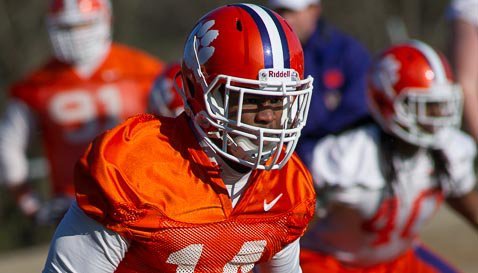
Former Clemson player says new Fair Pay to Play Act is "step in the right direction" |
The Fair Pay to Play Act was signed in California earlier this week and one former Clemson player at the forefront of the movement thinks it’s a step in the right direction.
California Governor Gavin Newsom has signed into law the Fair Pay to Play Act, which says colleges in California cannot punish their athletes for collecting endorsement money. That goes against NCAA rules, but the NCAA, in response to Newsom's signing of the bill, said it would continue its effort to make "adjustments" to its rules "that are both realistic in modern society and tied to higher education." Four years ago, the NCAA’s system of amateurism was brought to trial in Ed O’Bannon’s class-action lawsuit. The case centered on whether Division I men’s basketball and football players ought to be compensated for the commercial use of their names, images and likenesses. Back in 2014, former Clemson University football player Martin Jenkins sued the NCAA and its conferences for anti-competitive conduct and an injunction eliminating caps on compensation for student-athletes. The new law, which is scheduled to go into effect in January 2023, does not require schools to pay athletes directly as employees. Instead, it makes it illegal for schools to prevent an athlete from earning money by selling the rights to his or her name, image or likeness to outside bidders. It also allows college athletes to hire a licensed agent to represent them. Current NCAA rules do not allow a player to accept any compensation related to his or her status as a college athlete from outside sources. TigerNet reached out to Jenkins and he said that the new law is a step in the right direction. “It's not the be-all, end-all, but it's a step in the right direction. Obviously, with my involvement in the lawsuits the last couple of years I've had quite an insight into how things are run with the rules and regulation,” Jenkins said. “Considering the rules that have been in place, this is a major steppingstone. I don't an athlete's off-campus earnings should be limited by the NCAA's eligibility rules. This is a big win in a much bigger landscape.” Jenkins won his lawsuit – the judge ruled in his favor during the summer – and he’s pleased with his part in getting collegiate athletes money for their time and effort. “It opened the doors for people to understand what is going on so they can keep a closer eye on the rules and regulations,” Jenkins said. “I am sure it could have had an effect on this, because all we were doing was knocking down the door and getting people's attention and fighting for what we believe in. Now that people know what is going they can't really turn their back on it.” Detractors say that the new law will ruin college athletics, but Jenkins doesn’t agree. “I think it will have the reverse effect. I think it's a step in the right direction,” he said. “If we are looking at it from the standpoint of value - a lot of people say the athlete is getting free clothes and free education and shouldn't that be enough. If we are a regular student or on an academic scholarship, that could potentially be enough. The fact that we are looking at it from a strictly value standpoint, the average student over four years is making the school what, a hundred grand? While the football team alone is making millions of dollars a year. “So if you are looking at value, there is no comparison. Academic scholarships don't bring as much monetary value to the school and to the community the eight weekends a year when the city booms. The restaurants get more money and the real estate prices go up, and a lot of that in small towns like Clemson where football is the cause of that, that is on the sweat of the backs of the players. That is why I feel like this is a step in the right direction.” Jenkins also believes that other states will follow suit out of necessity. “They have to. Because now you have California schools competing with the schools in Texas and Texas will have to keep up,” Jenkins said. “And then Georgia will have to keep up with Texas and then Ohio and South Carolina.”
 Upgrade Your Account
Upgrade Your Account
Unlock premium boards and exclusive features (e.g. ad-free) by upgrading your account today.
Upgrade Now




